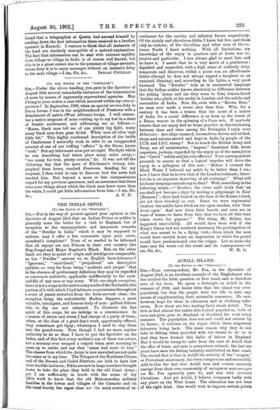THE INDIAN SEPOY.
[To THE EDITOR OF THE "SPECTATOR."] SIB,—Not in the way of protest against your opinion in the Spectator of August 23rd that an Indian Prince or soldier is generally none the better for a visit to England, but of exception to the unsympathetic and inaccurate remarks of the " Dweller in India " which it may be supposed to endorse, may I offer a few comments upon your corre- spondent's complaint? None of us needed to be informed that all sepoys are not Princes in their own country like Bug-Jargal and Major Bagshot's Black. But, on the other hand, are they in point of origin and intelligence comparable, as the " Dweller " assures us, to English farm-labourers ? "Ignorant," "uncivilised," "prejudiced," are descriptive epithets so very far from being " aculeate and proper " that in the absence of preliminary definition they may be regarded as communia maledicta, applicable indifferently to the rank- and-file of any race or any army. With one single exception, there is not a corps in the native army south of the Narbadda (the portion of it with which I had intimate acquaintance throughout a score of years) recruited from the farm-servant class; the exception being the redoubtable Madras Sappers, a most valuable, intelligent, and famous body of men : gallant fellows who to dig are not ashamed. To illustrate the fine spirit of this corps, let me indulge in a reminiscence. In a season of storm and stress I had charge of a party of them; when, at the close of a good day's work, opportunity offered, they sometimes got tipsy; whereupon I used to clap them into the guard-room. Now, though I had no more regular authority to do so than I have to put the Spectator on the Index, and of this fact every mother's son of them was aware, not a murmur ever escaped a culprit when next morning he came up to salute and say that "sense had come to him." The classes from which the Army is now recruited are not quite the same as in my time. The Telugus of the Northern Circars and of the Deccan and Ceded Districts are held to have lost their warlike instincts ; Sikhs are now in large numbers brought down to take the place they held in the old Coast Army ; yet I am sufficiently in touch with the scene of my life's work to know that the old Mahommedan military families in the towns and villages of the Carnatic and (in the rural tracts) the rayat class are the main sources of re- cruitment for the cavalry and infantry forces respectively. Of the stately and chivalrous Sikhs I knew but few, and those only as visitors ; of the Goorkhas and other men of the ex- treme North I knew nothing. With all limitations, my knowledge of the sepoy in quarters and at home was ex- tensive and particular. I was always glad to meet him, and he knew it. I assert that he is very much of a gentleman : dignified and respectful, with a high sense of soldierly duty, temperate and decorous, withal a pious son, an affectionate father (though he does not always regard a daughter as an unmixed blessing), and, according to his lights, a very good husband. The " Dweller " tells us in unreserved language that the Indian soldier knows absolutely no difference between the yelling 'Arrys and (as they seem to him) brazen-faced 'Aaviets who pluck at his medal in London and the sahibs and memsahibs of India. Now, Sir, even with a " Brown Bess," no man ever made a worse shot than that. Why, for a century it has been a truism that the scent of a native of India for a social difference is as keen as the touch of a Dacca weaver in the spinning of a Coan web. If anybody retorts that our sepoy had no home practice in discriminating between class and class among the Feringhis, I reply more Hibernico : Are ships manned, locomotives driven and stoked, shops and saloons served and kept in India by people of the I.C.S. and I.S.C. stamp ? Not to touch the British Army and Navy, are all missionaries, " laayers," theatrical folk, horse importers, jockeys, regarded by the sepoy as of the same jet as the " Ceevil " sahibs and.his own officers ? Your correspondent proceeds to assure us that a logical impulse will drive the sepoy to a syllogism of this sort: " Before I crossed the Black Water I believed my sahib to be better than I am ; now I know that he is own bhai of the London badmash ; there- fore he is an impostor deserving of all contempt." What will his home-keeping comrade say to that ? Well, something in the following strain :—" Brother, the verse saith truly that an ass shall not become a tiger by making a pilgrimage to Kiisi [Benares] ' ; thou halt looked on the face of the Kaisar-i-hind, yet art thou biwukilf as erst. Since we were regimental chokras the sahibs have lived on our open maidan, with ' four doors open.' And now when their beards and ours are in want of henna we learn from thee that we have all this time taken crows for pigeons ! " The thing, Mr. Editor, has happened unavoidably. All would have been well if the King's illness had not rendered necessary the prolongation of what was meant to be a flying visit,—from which the men would have carried home an impression in which the grand would have predominated over the vulgar. Let us make the beat—not the worst—of the event and its consequences.—I






































 Previous page
Previous page